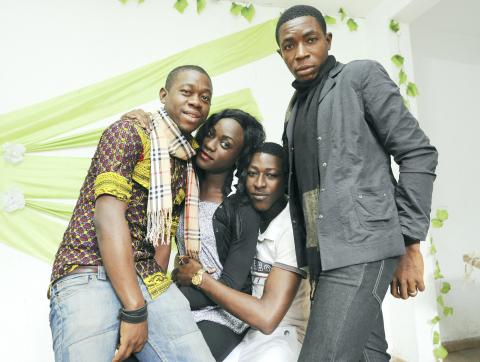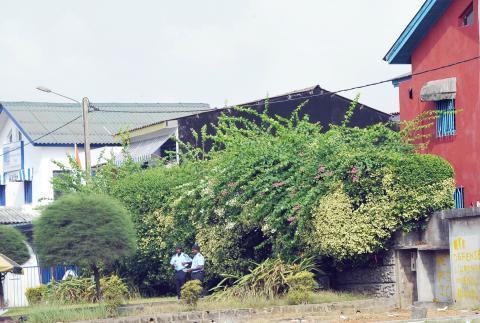No kissing, no petting. As gay bars go, this one is pretty well-behaved. But the crowd packing the Abidjan venue is relaxed and happy to be part of this haven of tolerance on a hostile continent.
“In a gay club, we are much freer than in straight places,” 22-year-old student Jacques tells AFP, looking on as three men sway to Ivorian music on the dance floor.
“We get no strange looks. Here we can unwind, feel at ease and let ourselves go.”

Photo: AFP
One man gently strokes his companion’s neck but displays of affection stop there. The strict social codes prevailing in Ivory Coast apply here too.
The patrons include several transvestites, one a 20-year-old teacher who goes by the name Malika, and who has been living as a woman by night and a man by day for the past three years.
“I live with a friend. Out of respect for his other friends and his job, I live as a man under his roof,” said Malika, wearing discreet makeup with a short wig and clad in an elegant patterned dress.

Photo: AFP
“But when I go about my own business, I am the way I want to be.”
With bars catering for lesbians, gays and transsexuals, the west African country stands out for its tolerance on a continent where homophobia is not just common but widely enshrined into law.
Some 30 African countries have declared homosexuality illegal. The parliaments of Nigeria and Uganda recently passed laws to punish gays with long prison terms — although Uganda’s President Yoweri Museveni blocked the harsh legislation.
In Mauritania, homosexuality is punishable by death.
“It’s no paradise here, but it’s a lot better than in other countries,” Malika said.
The picture is far from rosy, though: one of her transsexual friends found it difficult to get hospital treatment after she was stabbed in the chest.
And late last month dozens of homophobic protesters attacked the Abidjan offices of gay rights group Alternative Cote d’Ivoire, bashing in the doors and looting equipment.
Moussa, who manages one of the three gay bars in Ivory Coast’s economic capital, told of insults from passers-by and threats from the owner of the premises to withdraw the lease.
NO HOMOPHOBIC ACTS
And yet, in Abidjan, it remains possible to be gay — making it something of an El Dorado for gays from elsewhere in Africa, in Malika’s words.
That was certainly the case for Marinette, a bisexual woman who felt “threatened” in her hometown in Cameroon after several lesbian relationships, and came to Abidjan to sample the freedom of the city.
“This is nothing like my country, where one of my friends was threatened with rape because she had never slept with a guy,” said the young woman in her 30s, in a body-hugging red dress.
What makes Ivory Coast so much more tolerant than neighboring countries, where homosexuality is often perceived as deviant and shameful?
“Because we have not yet been subjected to homophobic legislation,” argued Fabrice, 26, who handles judicial affairs for Alternative Cote d’Ivoire.
A government official suggested that Ivory Coast, which is recovering from a bloody political and military crisis that ended in 2011, had more pressing matters to address than its citizens’ sexual orientation.
“There is considerable unemployment, and organized crime on a large scale. At the end of the day, homosexuality is a minor issue,” agreed Fabrice.
Even in country villages, where tradition reigns strong, homosexuality is “stigmatized without going too far”, he said.
“There can be criticism, and verbal abuse, but it’s hardly sharia law.”
Yet for all that gays, lesbians and transsexuals lay claim to a degree of freedom in Ivory Coast, many still choose to keep their sexuality under wraps.
“Tonight, everybody is gay,” said Armand, a 32-year-old waiter at the bar. “But tomorrow morning, we’ll pretend we don’t know one another. Everyone hides who they are.”

June 9 to June 15 A photo of two men riding trendy high-wheel Penny-Farthing bicycles past a Qing Dynasty gate aptly captures the essence of Taipei in 1897 — a newly colonized city on the cusp of great change. The Japanese began making significant modifications to the cityscape in 1899, tearing down Qing-era structures, widening boulevards and installing Western-style infrastructure and buildings. The photographer, Minosuke Imamura, only spent a year in Taiwan as a cartographer for the governor-general’s office, but he left behind a treasure trove of 130 images showing life at the onset of Japanese rule, spanning July 1897 to

In an interview posted online by United Daily News (UDN) on May 26, current Chinese Nationalist Party (KMT) Chairman Eric Chu (朱立倫) was asked about Taichung Mayor Lu Shiow-yen (盧秀燕) replacing him as party chair. Though not yet officially running, by the customs of Taiwan politics, Lu has been signalling she is both running for party chair and to be the party’s 2028 presidential candidate. She told an international media outlet that she was considering a run. She also gave a speech in Keelung on national priorities and foreign affairs. For details, see the May 23 edition of this column,

The Taiwan People’s Party (TPP) on May 18 held a rally in Taichung to mark the anniversary of President William Lai’s (賴清德) inauguration on May 20. The title of the rally could be loosely translated to “May 18 recall fraudulent goods” (518退貨ㄌㄨㄚˋ!). Unlike in English, where the terms are the same, “recall” (退貨) in this context refers to product recalls due to damaged, defective or fraudulent merchandise, not the political recalls (罷免) currently dominating the headlines. I attended the rally to determine if the impression was correct that the TPP under party Chairman Huang Kuo-Chang (黃國昌) had little of a

At Computex 2025, Nvidia CEO Jensen Huang (黃仁勳) urged the government to subsidize AI. “All schools in Taiwan must integrate AI into their curricula,” he declared. A few months earlier, he said, “If I were a student today, I’d immediately start using tools like ChatGPT, Gemini Pro and Grok to learn, write and accelerate my thinking.” Huang sees the AI-bullet train leaving the station. And as one of its drivers, he’s worried about youth not getting on board — bad for their careers, and bad for his workforce. As a semiconductor supply-chain powerhouse and AI hub wannabe, Taiwan is seeing